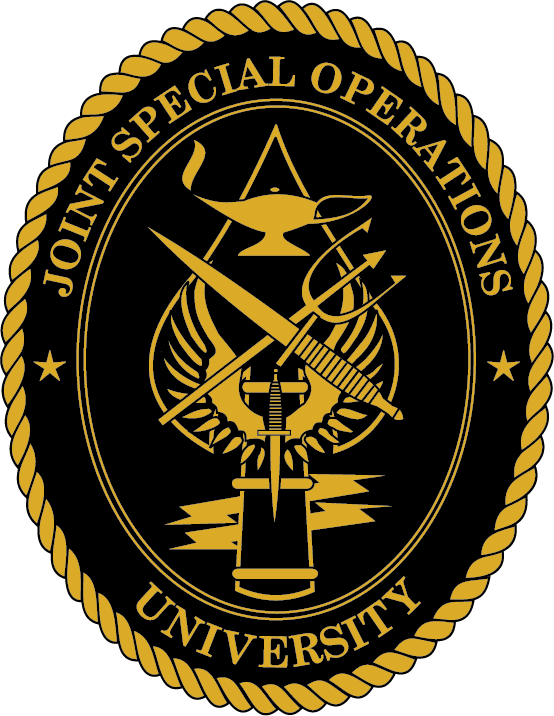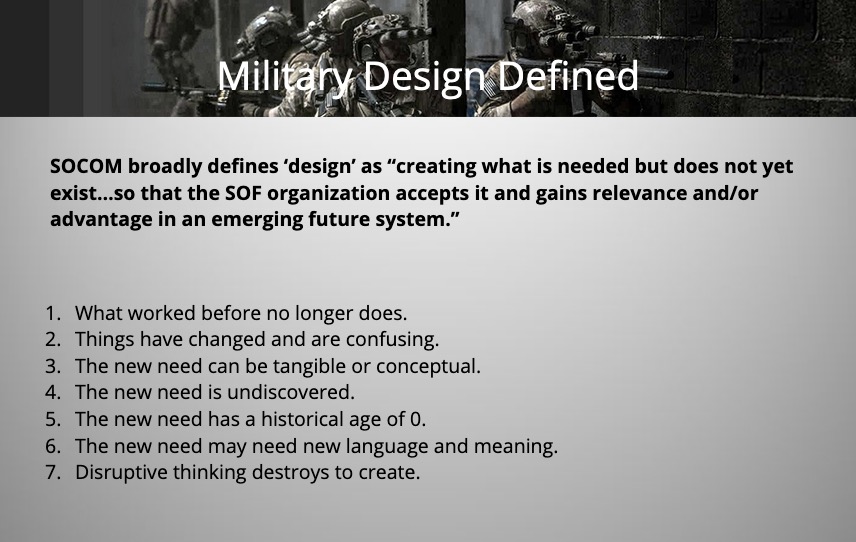
“The final weapon is the brain, all else is supplemental.” John Steinbeck
“Military Design” is the emergent hotness in special operations thinking. The Joint Special Operations University has an active focus area in military design. I welcome this new interest, though I do recognize it as the renaissance of some concepts that popped up in the 70s and 80s, notably with LTC Jim Channon’s outline for training the next generation of special operators (for the 80s!) in the First Earth Battalion concept paper.
I’ve been incorporating design elements into my training evolutions since the 80s. I describe myself as a “training designer” and don’t confine myself within the box of instructor, teacher, coach, or facilitator.

This definition quite elegantly describes my approach to training design. My designs incorporate a fusion of accelerated expertise concurrent with stress inoculation which serves the needs of some elite personnel quite well. An example of a hasty design using these principles is HERE where I designed a professional level counter-terror driving course for non-professionals.
Dr. Graicer’s presentation introduces a number of brilliant and useful ideas I have taken up. Her comment about “operationalize don’t intellectualize” exactly mirrors my own approach to training design. One of the challenges I’ve always had with weaving cutting edge cognitive neuroscience into my training designs is the pushback. Things like: “You don’t have a Ph.D!” or “Where’s the research for this?” One of the reasons I moved to experiential training rather than lecture/demonstration for the skill sets I design for was to bypass the resistance to new material those stated biases represent. By DOING the exercises and USING the installed skills, it makes it easy for me to AFTER THE FACT explain some or all of the science…instead of trying to change their cognitive maps beforehand. Experience, especially experience under stress, does all the cognitive remapping necessary to accelerate expertise in the areas I design for.
So “operationalize don’t intellectualize” is another way of saying if it works, why do you care WHY it works? Instructors may need to do know that, but do you have to understand metallurgy, chemistry, eye anatomy and the structure of the visual cortex in order to shoot? No, you do not. Check my piece referenced above on critical path design and driver training. You only need what you need in order to use the skill. Anything else is nice to have.
When I was a young gunslinger, I was very impatient with long lectures and war-stories about the importance of mindset. To me the importance was self-evident. What was lacking in those lectures was HOW TO DO MINDSET. I knew I had it, and I’d had it reinforced in violent scenarios. But I didn’t know how I did it. And that journey of self-exploration led me down the path I’m on today, the path that Dr. Graicer calls the “cognitive operator” or the practitioner of skilled cognitive dominance in conflict.
That’s the piece of the “super-soldier” equation that’s so necessary today and that’s what’s driving our JSOU and other countries (like Dr. Graicer’s Israel, where I’ve been invited on several occasions to present and teach) to work on ways to enable and train cognitive dominance. The war-fighters of the future aren’t going to be only in declared wars; in fact the trend is deployment in “grey zone” conflict, as the SAS has recently been tasked here.
The super-soldier we need isn’t just the superior physical specimen, though that will be a requirement. They will need to be cognitive operators exercising cognitive dominance in grey zone and hybrid operations: diplomat, assassin, troop leader, orchestrator of autonomous drones, calling precision strikes down from space, managing an information and narrative warfare campaign, handling a cyberwar initiative utilizing deep fake videos and bot-controlled social media, disrupting influence and order of battle to the advantage of their own leadership.
I described this melange of CREATIVE application of hybrid skills as needing “Lawrence of Whatever-Stan” in a homage to T.E. Lawrence. We need cognitively enhanced technologically savvy Lawrence of Arabia’s as warrior-diplomats/super soldiers.

Read Lawrence’s SEVEN PILLARS OF WISDOM
Or just watch the MOVIE
My friend and colleague John Robb predicted many years ago the next evolution of warfare, the 5th generation, as being the generation of the “super empowered individual.” We’re already there. Lone actors with a laptop and knowledge can disrupt nations. Small self contained cells or operating groups can wage war across multiple domains against numerous opponents. The only logical response to that is to field the same: super-empowered individuals, self contained cells and operating groups. i.e. special operators and operations.
So while all this is high in the random cool factor, and obviously applicable to .mil and .gov audiences, why should we mere mortal civilians be concerned?
Because emergent technology in cognitive enhancement as a stepping stone to achieving cognitive dominance will have an impact on us whether we can afford it (like Elon Musk and Jeff Bezos can) or whether we’re actively working in units where those skill sets are purposed to the larger mission of nation-states or trans-national actors. What will it be like when some of those cognitive dominance skill sets that aren’t merely physical in nature filter out into the world, skills like instantaneous hypnosis of the unwitting? Calibration of your deepest unconscious motivational triggers at a glance? Ability to manipulate a group or team of “unenhanced” instantly? Technology that can capture and control all your digital interface with the internet instantly?
And what happens with the enhanced cognitive operator when they retire, quit, or are past their “use by” date? What about that cognitive skill set being brought into politics, business…crime?
When the USGOV dumped hundreds of the most experienced black special operators in the world out the door with no retirement benefits after the Church Commission in the 70s, a fair number of the most dangerous US operators found ways to leverage their skills into lucrative areas like freelance training, smuggling, and organized crime. The collapse of the Soviet Union and the end of cash support to client states like Cuba, East Germany, Bulgaria, etc. put many elite military special operators and paramilitary intelligence officers taking their skills into the black market for the highest bidders. This contributed to the rise of narco-cartels around the world and a quantum leap in non-nation-state actors ability to create and maintain nation-state level intelligence and paramilitary operations. As warfare along the southern border of the US illustrates.
In the background of all that are some seriously well trained and experienced special operators.
And the rise of the cognitive operator takes us up another level with special operator skillsets.
So the prospect of them running around loose, and the technology that enables their skills ready available, might give the reasonable person pause. Might be a good idea to stay on top of that subject, yes?

